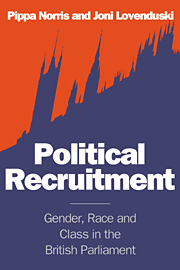Book contents
- Frontmatter
- Contents
- List of figures
- List of tables
- Preface
- 1 Puzzles in political recruitment
- Who selects and how?
- Who gets selected, and why?
- 6 Supply and demand explanations
- 7 Gatekeeper attitudes
- 8 Candidate resources
- 9 Candidate motivation
- 10 Comparative candidate recruitment
- Does the social bias matter?
- Appendix A Details of the survey design and sample
- Appendix B Questionnaires
- Notes
- Bibliography
- Index
10 - Comparative candidate recruitment
Published online by Cambridge University Press: 07 December 2009
- Frontmatter
- Contents
- List of figures
- List of tables
- Preface
- 1 Puzzles in political recruitment
- Who selects and how?
- Who gets selected, and why?
- 6 Supply and demand explanations
- 7 Gatekeeper attitudes
- 8 Candidate resources
- 9 Candidate motivation
- 10 Comparative candidate recruitment
- Does the social bias matter?
- Appendix A Details of the survey design and sample
- Appendix B Questionnaires
- Notes
- Bibliography
- Index
Summary
This chapter seeks to understand recruitment within a wider cross-national context. We have established that there are few women and working-class MPs in the British parliament: is this a universal phenomenon? To compare countries a distinction can be drawn between four levels of analysis (see figure 10.1). First, there are systematic factors which set the broad context within any country – the legal system, electoral system, party system and structure of opportunities. Secondly, there are factors which set the context within any particular political party – the party organisation, rules and ideology. Thirdly, there are factors which most directly influence the recruitment of individuals within the selection process – the resources and motivation of candidates, and the attitudes of gatekeepers. Lastly, there is the outcome of the process for the composition of parliaments.
The aim of this chapter is fourfold: first, to see whether the social bias in the British parliament is a universal phenomenon; secondly, to consider how the legal system, electoral system, party system and structure of opportunities influence the recruitment process; thirdly, to analyse how decisions over recruitment vary with different party organisations; lastly, to consider what strategies have been employed by parties to overcome the social bias of legislatures. To set Britain in context, this chapter compares recruitment to the lower house of national legislatures in twenty-five established liberal democracies.
The outcome of the recruitment process
Comparative research has established that political elites tend to be drawn from higher status professional occupations worldwide, although there is considerable cross-national variation in the particular professions which are most heavily represented in each country.
- Type
- Chapter
- Information
- Political RecruitmentGender, Race and Class in the British Parliament, pp. 183 - 206Publisher: Cambridge University PressPrint publication year: 1994
- 1
- Cited by



